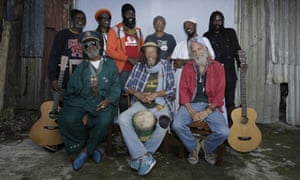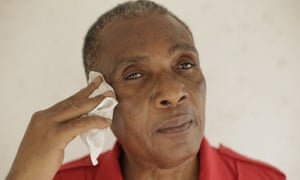‘We’re handing the baton over to the future leaders’ … Kiddus I. Photograph: Bernard Benant
Greats including Cedric Myton and Ken Boothe teamed up with a new generation of musicians to record an album the old way – unplugged and outdoors
To hear one of the best roots reggae albums to come out of Kingston, Jamaica, this spring, you have to drive a long way from Trench Town. In fact, you have to leave the city altogether and head up high into the mountains that surround it.
Not every taxi is keen on making the trip, so you might want to enlist a local’s help and hope their car’s suspension can take it (the vehicle I find myself in seems to have given up on the concept of suspension long ago, the undercarriage cracking as we bounce along the potholes). As you climb, you watch Kingston unfurl below, eventually arriving not at a recording studio, but a house hidden in the hills. And on the balcony, overlooking the rolling lush greenery of the Blue Mountains, is where some of reggae music’s biggest legends – from the Congos’Cedric Myton to Ken Boothe – have congregated to record alongside talents from the younger generation.
“
We’re handing the baton over to the future leaders,” says Kiddus I, a 72-year-old Rastafarian who has been recording reggae music since the beginning of the 1970s and is rarely, if ever, seen without a spliff dangling from his lips. “And if they’re properly inspired, then we know that the fire keeps burning.”
The fruits of these sessions can be heard on Soul of Jamaica, a new album released through French label Chapter 2. It’s part of its Inna de Yard series, which aims to capture the sound of reggae as it used to be by recording acoustically, outside. As Myton puts it: “We went yard to yard in those days, so from 1965 we have been doing these things. And now it goes on again … great chanting, great music, great culture.
Inside the house where the Soul of Jamaica sessions took place, stacks of vintage vinyl fill the front room, along with various pieces of art and the odd discarded instrument. On the sofa, a somewhat stoned Neville Ingram of the Viceroys has passed out, while outside on the terrace, his two bandmates are brewing coffee with Kiddus I. An audience with the latter is quite an experience. Fondling an impressively fragrant marijuana branch, he rhapsodises about the history of Jamaican music, breaking off into poetic ruminations on the nature of life and, occasionally, heading down extremely tangential alleyways. Over the course of an hour, he tells me about the time an acid trip gave him x-ray vision (“I could look through me to my bone, everything in life living inside of me”), recalls the time he saw a spaceship in the Cherry Gardens area of Kingston (“It was there for five hours”) and recounts a version of The Well to Hell hoax – in which Siberian oil miners were alleged to have drilled down into hell – as stone cold fact. Fresh off a long-haul flight from the UK, it’s amusingly tricky to keep up.
The album is, in some small part, a reaction to the digitally enhanced and sexually charged dancehall and hip-hop that makes up much of Jamaica’s current musical output. Kiddus I has a theory that digital music short-circuits a listener’s electromagnetic system, thereby weakening them. He says you can test it by sticking out your arm and letting someone press down on it while listening to the two forms of music: “With analogue you don’t lose your strength,” he says. “But your resistance is weaker with digital music.”
Before we have time to test his theory, Kiddus I is invited to step on to the balcony and sing. Today, he is recording a version of Edith Piaf’s Hymne à l’Amour – Chapter 2’s French influence making it’s way into the music – which pianist Robbie Lynn begins gently before raising the tempo and hitting offbeat chords for added Jamaican flavour.
 Inna de Yard: front (left to right) Winston McAnuff, Kiddus I, Cedric Myton; rear (left to right) Winston ‘BoPee’ Bowen, Alphonso Craig, Derajah, Robbie Lyn, Kush McAnuff, Ruel ‘Rice’ Ashburn. Photograph: Bernard Benant
Inna de Yard: front (left to right) Winston McAnuff, Kiddus I, Cedric Myton; rear (left to right) Winston ‘BoPee’ Bowen, Alphonso Craig, Derajah, Robbie Lyn, Kush McAnuff, Ruel ‘Rice’ Ashburn. Photograph: Bernard BenantOut on the terrace, where we are served delicious food – a Rastafarian vegan diet – I chat to Myton about the project. An upbeat personality, with a high-pitched laugh and thick white dreads, he sees the sessions as helping to provide an uplifting voice in a world of turbulence: “The people have to come to the realisation that what we have been taught from childhood days is a big brainwashing,” he says. “My old dream was that things have to be better, and that is my thing now.”
On Soul Of Jamaica, Myton reworks the 1979 Congos track Youth Man and is proud that his old music endures. “Heart of the Congos, our first album, is an antique for life,” he says proudly. “When we were doing it, we never really know that it would be so powerful.”
He says it’s important for the younger generation to hear these songs afresh – and that generation includes musicians such as Kevor “Var” Williams, a rootsy, soulful singer in the five-piece band the Pentateuch Movement. Softly spoken and wearing desert boots with red, gold and green socks, Var grew up singing in church while being schooled in Marcus Garvey and black history. For Soul of Jamaica, he has reworked one of his band’s songs, Crime, and says that recording with the older generation has been eye-opening. “Everyday I learn something by just observing,” he says. “This morning I was watching uncle Winston [McAnuff] just singing – it’s recording, but it’s also a performance, it’s a live show. The moment you get a chance to sing you have to sing right from the soul.”
Later on I see him put those words into practice, delivering a passionate performance that continues into the night as sound engineer Laurent Jais tries to capture the perfect version on his laptop. At one point Jais thinks he’s got it, before a dog interrupts. “Over here we can just ignore the dogs,” he says, cackling, “but back in Paris the dogs will be very much there.”
Jais has a wild-eyed intensity and workaholic tendencies. I watch him complete a 12-hour shift with barely a toilet break, and he admits that his two-week stay on the island has passed without him having had a proper shower. But Var is hitting a sweet spot and he doesn’t want to miss it, so rather than call it a day the sessions simply turn into a party, with musicians inside the main room dancing as huge water pipes are passed around.
 ‘If we made a mistake, we had to do it all again’ … Ken Boothe. Photograph: Bernard Benant.
‘If we made a mistake, we had to do it all again’ … Ken Boothe. Photograph: Bernard Benant.The next day I go to Trench Town with Kiddus I and Winston McAnuff. Like Kiddus I, the 59-year-old McAnuff is undergoing a late career renaissance, thanks in part to his unlikely collaborations with French accordionist Fixi. He takes us to a tiny bar that someone promptly opens up to serve us Dragon Stout in the baking heat. There is no room to stand because the floor is taken up by several gigantic speakers from which the barman blasts out a reggae cover version of Hey Jude. Apparently, it’s McAnuff’s latest single.
It’s here in the yards of Trench Town that the musical culture Inna de Yard intends to capture was born – a few blocks away is the government yard that Bob Marley once called home. Later that day, when I visit Ken Boothe at his grand blue and white house, he tells me it was a piano at the Boystown school in Trench Town that first forged his musical interest. “Every day I would mess around on it,” he says.
As Boothe’s grandchildren run around our feet, he shows us around his homemade “museum”, a room stuffed with posters, pictures and framed vinyl that document Jamaican musical history and therefore his own – he first toured the UK in the mid 60s and was one of the first reggae musicians to have a major hit here thanks to his version of Everything I Own. Recording for Inna de Yard, he says, reminds him of those early days, when he was known as Mr Rock Steady.
“Back when I recorded with Sir Coxsone and Duke Reid, there were just two tracks so everybody had to record at the same time,” he says. “If we made a mistake, we had to do it all again.”
 Cedric Myton & Kiddus I in the studio in the hills. Photograph: Baghir
Cedric Myton & Kiddus I in the studio in the hills. Photograph: BaghirHalf a century on, Boothe is still recording, and for Soul of Jamaica he reworked his own track Artibella, a song he loves so much his granddaughters all have variations of the name (Gabrella, Sabella and Abrella). “This version is quieter and more subtle, because of the nyabinghi,” he explains. “But wherever I play it, the crowds ignite … fire!”
We retire outside to sit in the sun, chew moringa seeds and drink rosemary tea in Boothe’s yard. Appreciating the beauty and calm of such surroundings is perhaps key to understanding the appeal of Soul of Jamaica. While it would be easy to dismiss the project as backward-looking or disconnected from some of the grittier day-to-day life in Kingston, that would be to ignore the bigger ecological message that the record hopes to send out. After all, what is Soul of Jamaica if not an example of how human beings can work in harmony with the natural world?
As Var puts it: “Previously, maybe some people don’t want to hear a bird pass in the recording. But the view of the mountains, the vibe just right … this is what freedom is.”
The Soul of Jamaica: Inna de Yard is released on Chapter 2 on 17 March.
Comments